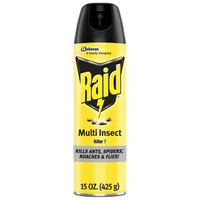Pest control mistakes – 5 things pros say will only make infestations worse
Pest control tips and tricks can seem like a good idea, but sometimes cutting corners does more harm than good


Relying too heavily on a series of hacks, tricks, and shortcuts can lead us to make some common pest control mistakes that only make an otherwise manageable infestation worse.
Whether you are doing something as simple as getting rid of gnats, or dealing with a more sinister problem like getting rid of yellowjackets, making mistakes early on could prolong the infestation, or simply move the existing pests around your home, making harder work for you or for a pest control professional further down the line.
Here, pest control experts have shared the five most common pest control mistakes they see people making, and what to do instead.
Pest control mistakes to avoid
When approaching pest control, it is important to remember that there is no ‘one-size-fits-all’ solution to pest problems. However, these mistakes are universal and can have the same damaging effects no matter the pest at hand.
1. Underestimating the size of a pest infestation
Arguably the biggest and most common mistake people make when it comes to infestations is underestimating what they are really dealing with, says Bryan Clayton, co-founder of GreenPal. ‘It's like seeing one ant at a picnic and assuming it's all alone,’ he says.
‘In my experience, it's usually just the tip of the iceberg. Most people don't know this, but pests like termites, ants, and rodents are masters of hide-and-seek. They can cause a heap of damage before you even know what hit you.
'So, the first rule of thumb is to never underestimate a pest issue, no matter how small it may appear.’
2. Relying too heavily on natural deterrents
Natural pest control has a time and place, such as deterring chipmunks in your yard without harming them, killing ants with vinegar, or making homemade bug sprays to deal with flies on houseplants. However, these solutions are always weaker than chemical alternatives and are often not strong enough for large-scale infestations or damaging pests.
‘Natural products usually take longer, more effort is required, and they typically cost more over time,’ explains Matt Smith, pest expert and owner of Green Pest Management. ‘Used in the wrong way they will also push pests around and not really take care of the problem. Using them consistently and regularly may eventually pay off, but it shouldn’t be a go-to for every situation.’
Natural pest control has a time and place, such as deterring chipmunks in your yard without harming them or making homemade bug sprays to deal with flies on houseplants. However, these solutions are always weaker than chemical alternatives and are often not strong enough for large-scale infestations or damaging pests.
‘Natural products usually take longer, more effort is required, and they typically cost more over time,’ explains Matt Smith, pest expert and owner of Green Pest Management. ‘Used in the wrong way they will also push pests around and not really take care of the problem. Using them consistently and regularly may eventually pay off, but it shouldn’t be a go-to for every situation.’
Raid Multi-Insect Spray | $6.57 at Walmart
This multi-purpose bug spray is just as cheap as making your own natural sprays, and it can often be far more effective. It is a great tool to have on hand for the first sign of pests in your home.
3. Not calling in professionals
Pest control companies exist for a reason, and it is not just to get you to spend money.
‘Professionals have access to tools and treatments not available to the general public, and they have the training to use them effectively and safely,’ A.H. David, pest control expert and writer at Pest Control Weekly advises. ‘They are more than worth giving a call when you think a pest problem is a little bigger than a few wiley bugs.’

A.H David is the co-founder and editor-in-chief of Pest Control Weekly. By hobby, he is a gardener and has experience dealing with all types of pests found in backyard gardens. His goal is to provide well-researched and authentic information about pests from his own experiences.
4. Not acting fast enough
No matter which pest you are up against, be it getting rid of ants in the kitchen, or ticks in a yard, it is vital that you act as soon as you see signs of a problem – not avoiding it and hoping it will go away in time. Delaying treatment can lead to a worsening pest infestation.
‘Pests multiply rapidly, so it's crucial to take action as soon as you detect signs of an infestation. Timely intervention is key to minimizing the impact and preventing further escalation,’ explains Diana Cox, horticulturist, garden expert, and owner of The Gardening Talk.

Diana started her website as a way to help others who are new to the world of gardening and plant care. She has been growing plants since she was a little girl and started to document her experience in gardening a few years ago.
5. Passing over preventative measures
Prevention is always better than a cure, and ignoring preventative measures just because you think you have never had a pest before is a surefire way to end up with an unexpected pest infestation you are not prepared for, says A.H. David, pest control expert.
‘The best way to handle a pest problem is to prevent it from happening in the first place. Many people only address pests once they've become a problem, instead of taking preventative measures like sealing entry points, keeping a clean home, and addressing moisture issues which can save time, money, and headaches in the future.’
FAQs
How long after pest control should bugs be gone?
Pest control is not a quick process, especially for large-scale infestations. While some pests may be gone within the week, it could take up to six weeks for your home to return 100% back to normal after a pest control treatment, with repeated treatments sometimes required to help keep pests at bay.
What are the hardest pests to control?
Some of the hardest pests to deal with yourself are termites, bedbugs, and cockroaches due to their durability and ability to cause damage to your home and health. As a result, it would be a mistake to try to deal with these pests using solely natural treatments, or without professional consultation as letting them spread for too long without effective treatment will only result in a more serious and damaging problem that is even tougher to get rid of.
When approaching pest control, it is important to follow your gut and not cut corners. Spending money on a professional if you feel like you are out of your depth is better than waiting for the problem to sort itself out. Taking the time to educate yourself about specific pests your home or area may be more prone to is also useful, so you know what to be on the lookout for.
Sign up to the Homes & Gardens newsletter
Design expertise in your inbox – from inspiring decorating ideas and beautiful celebrity homes to practical gardening advice and shopping round-ups.

Chiana has been at Homes & Gardens for two years and is our resident 'queen' of non-toxic living. She spends most of her time producing content for the Solved section of the website, helping readers get the most out of their homes through clever decluttering, cleaning, and tidying tips. She was named one of Fixr's top home improvement journalists in 2024.
-
 Nectar vs Layla – which mattress brand is best on test?
Nectar vs Layla – which mattress brand is best on test?I've set the Nectar Premier Hybrid Mattress and the Layla Hybrid Mattress head to head to help you work out which mattress meets your needs
By Emilia Hitching Published
-
 Barack and Michelle Obama's neutral accent chair is the perfect living room focal point – you can recreate their serene style in any-sized home
Barack and Michelle Obama's neutral accent chair is the perfect living room focal point – you can recreate their serene style in any-sized homeThis designer-approved essential fits into every modern living room – it's beautiful enough to stand alone, while pairing well with your favorite cushion
By Megan Slack Published
